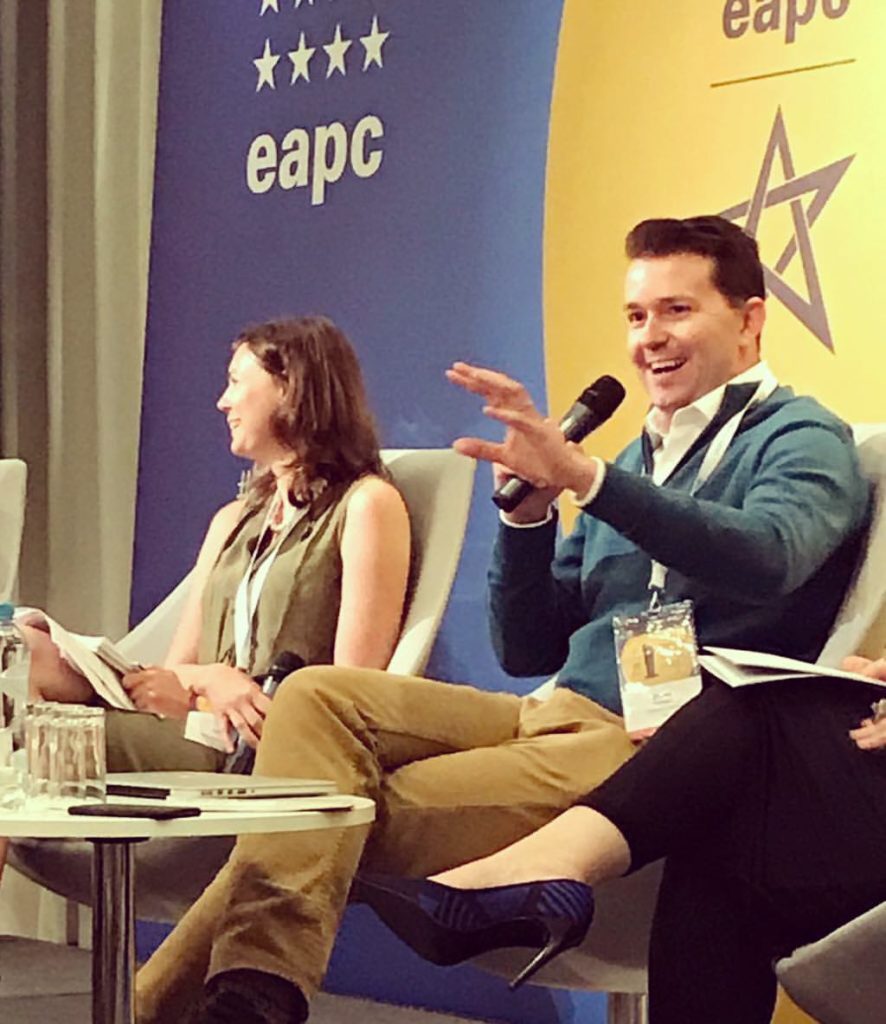In the latest of our Northern Roots series, where we speak to people originally from Northern Ireland but currently living elsewhere, our interviewee is Shane Greer. You can follow Shane on Twitter @shanegreer.
1. Tell us about yourself. When did you leave Northern Ireland, and where did you go? What do you do now?
I left Northern Ireland in 2001 to go to university in Liverpool. After that it was on to Glasgow for my masters before then moving to London by way of a three-month internship in Washington, DC. These days I live in Washington, DC.
Somewhere along the way I fell into politics, and ended up co-founding a magazine with a friend, Iain Dale, in 2008. We built that into a broader publishing and events business, acquiring a number of other publications and events businesses and ultimately selling it all in 2012.
After a year with the acquiring company my wife and I moved to Washington, DC with our daughter. These days I run Campaigns & Elections, a publishing and events business serving the political campaign industry, with my business partner Shane D’Aprile after we both took over the company in 2015.
2. What do you think when you see the Northern Ireland of today, in the news and on social media?
In so many ways I’m amazed and delighted by how much progress the place has made. I had a difficult relationship with Northern Ireland growing up. It’s no exaggeration to say that I really hated the place as a child, and did everything I could to get away from it. There just seemed to be so much to lament, and so little opportunity for someone looking to get ahead in life.
But now you see venerable publications like the New York Times publishing glowing reviews about Belfast as a weekend break destination. The sense you get is of a place that’s developed tremendously.
I was back in Northern Ireland in May for the first time in more than six years and in some ways it felt like a different country to the one I left.
3. Are you hopeful for Northern Ireland’s future? Will Brexit make a difference?
Overall, yes. I think as the current generation of political leadership passes on, we’ll see a more normalized, less-sectarian, politics emerge. And over a few generations I see no reason why the divisions of the past won’t, in every meaningful sense, melt away. Northern Ireland has come a long way, and still has a long way to go, but the path only leads in one direction.
The big challenge, though, is economic. And that’s where I do feel a lot of concern. Not because of Brexit, but because we live in a globalized world that’s being transformed by automation and artificial intelligence. Northern Ireland is a small place with an economy dominated by the public sector. If it wants to compete, meaningfully, in the future it can’t continue to rely on the public purse. I worry that it will be too slow to adapt to that reality, and that when it does adapt, the boat will have already sailed. That, more than anything else, is Northern Ireland’s biggest challenge.

4. Do you think you will return to Northern Ireland? What could convince you to come back?
Don’t get me wrong, we’ll definitely visit every few years, and look forward to it when we do, but it’s not somewhere we can imagine ourselves living. London’s home for us in the UK, so that’s where we’d move if we returned.
One side point on this, when we did visit recently I had to hop across to Brussels on business for a couple of days. I couldn’t believe how difficult it was to get there. Neither of the Belfast airports offered direct flights, so the quickest option was to drive two hours to Dublin and fly from there. That lack of connectivity alone makes Belfast unworkable for us, and I have to imagine it poses a challenge more broadly when it comes to investment in NI.
5. What can Northern Ireland learn from the place you live now?
One of the things I love most about the U.S., and London for that matter, is the embrace of new ideas, the go-get-’em attitude in pursuing those ideas and the acceptance, even celebration, of failures along the way to success. That wasn’t my experience of Northern Ireland, but as the country’s politics normalize and it moves further away from its troubled past, I’m confident we’ll see that change.
That said, I think Washington, DC could learn a great deal from Northern Ireland when it comes to compromise in politics. In a democracy you have to be able to work with your opponents. That’s not always easy, as Northern is currently demonstrating, but the talks continue and a compromise will emerge to take the country forward on a shared path.
6. If Northern Ireland had a president with sweeping powers, and it was you, what would you do?
Integrated education. When children from different communities are educated together, the traditional divides fade away. One of the greatest privileges of my life was getting to attend Lagan College, Northern Ireland’s first planned integrated school. Lagan’s motto, Ut Sint Unum (that they may be one) captures perfectly the transformative power of integrated education.
93% of Northern Ireland’s children still attend segregated schools. To my mind that’s the single greatest obstacle standing in the way of a truly unified society in which sectarianism is written into the pages of history books, not painted onto curbstones.
7. What would you like to see more of on Northern Slant?
I’d love to hear from entrepreneurs in Northern Ireland and see a spotlight being placed on the startup scene. And not just tech startups. There’s a lot happening on that front, and the future of Northern Ireland’s economy depends on folks who are prepared to take risks to turn their business ideas into reality.

8. If you could ask three Northern Ireland politicians (past or present) to dinner, who would they be? And why?
I hate to be cliche, but I’d love to have dinner with Ian Paisley Sr and Martin McGuinness. I remain astonished by their willingness to rise above ideology and take Northern Ireland forward to a more stable and peaceful future. It’s easy to behave how you always have, it’s much more difficult to act boldly in the pursuit of a goal many, if not most, feel is unattainable.
9. Do you have a favourite quote, or mantra?
I always love this, by Edmond Dantes in Alexandre Dumas’ The Count of Monte Cristo, “Life is a storm, my young friend. You will bask in the sunlight one moment, be shattered on the rocks the next. What makes you a man is what you do when that storm comes.”
10. What’s your message for people back home?
I’d encourage young people in Northern Ireland to take the opportunity to spend at least a year living somewhere else in the world. Frankly, that’s something I’d encourage young people anywhere to do, but I think it’s particularly important in places that are emerging from conflict. You can always move back, but spending time away will give you a fresh perspective on the world, exposure to new and different ideas and a deeper understanding of what you want for your own life.
Also published on Medium.
